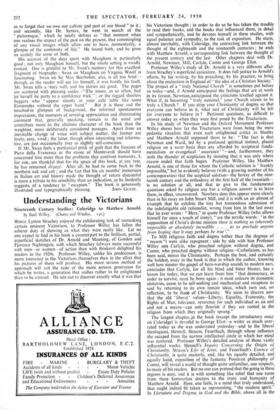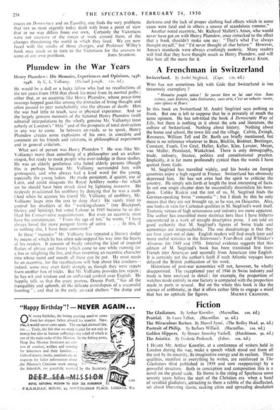Understanding the Victorians
Nineteenth Century Studies: Coleridge to Matthew Arnold.
• By Basil Willey. (Chatto and Windus. ifs.)
WHILE Lytton Strachey enjoyed the exhilarating task of unmasking certain eminent Victorians, to Professor Willey has fallen the soberer duty of showing us what they were really like. Let no one expect to find in his book a counterpart to the brilliant, partial, superficial sketches of Dr. Arnold and Manning, of Gordon and Florence Nightingale, with which Strachey (always more successful with men—or women—of action than with thinkers) delighted his readers in the 1920s. Professor Willey, unlike his predecessor, is more interested in the Victorians themselves than in the effect that his pictures of them will produce. His more serious method of approach will suit the taste of the more serious generation for which he writes, a generation that wishes rather to be enlightened than to be amused. He sets out to discover exactly what it was that
his Victorians thought ; in order to do so he has taken the trouble to read their books, and the books that influenced them, in detail and sympathetically, and he devotes himself in these studies, with
equal patience and sympathy, to the task of exposition. He starts, almost inevitably, with Coleridge, the connecting link between the thought of the eighteenth and the nineteenth centuries ; he ends
with Matthew Arnold, a corresponding link between the thought of the present century and the last. Other chapters deal with Dr. Arnold, Newman, Mill, Carlyle, Comte and George Eliot.
Professor Willey's study of Dr. Arnold is a very different affair from Strachey's superficial caricature. It does full justice to Arnold's efforts, by his writing, by his preaching, by his practice, to bring about the realisation in England of" the idea of a Christian Society." The project of a "truly National Church" is sometimes put before us today—and, if Arnold anticipated the feelings that are at work in its favour, Newman,,anticipated the criticisms levelled against it. What if, in becoming "truly national," your Church ceases to be truly a Church ? If you strip your Christianity of clop-ha so that everyone can believe in it, what sort of Christianity will be left for everyone to believe in ? Pertinent questions, as difficult to answer today as when they were first posed by the Tractarians.
In his study of Newman and the Oxford Movement Professor Willey shows how far the Tractarians were from being the mere pedantic ritualists that even such enlightened critics as Stanley and Matthew Arnold supposed them to be: "The fact is that Newman and Warn, led by a profound spiritual instinct, placed religion on a surer basis than any afforded by scriptural funda- mentalism or evangelical ' assurance ' "—and, furthermore, they stole the thunder of scepticism by insisting that it was only where reason ended that faith began. Professor Willey, like Matthew Arnold, is one of those for whom the Catholic solution is "frankly impossible," but he evidently believes (with a growing number of his contemporaries) that the sceptical solution—the heresy of the nine- teenth century and the orthodoxy of the first half of the twentieth— is no solution at all, and that to give to the fundamental questions asked by religion any but a religious answer is to leave them, in effect, unanswered. Nowhere does this appear more clearly than in his essay on John Stuart Mill, and it is with an air almost of triumph that he exhibits the tiny but tremendous admission of the indefatigable old rationalist, wrung from him in the last essay that he ever wrote: "Here," to quote Professor Willey (who allows himself for once a touch of irony), "are the terrific words: 'in the supposition of Christ's divine mission there is nothing so inherently impossible or absolutely incredible . . . as to preclude anyone from hoping that it may perhaps be true '."
To Mill religious faith and dogma (other than the dogmas of "reason ") were alike repugnant ; side by side with him Professor Willey sets Carlyle, who preached religion without dogma, and Comte, who preached dogma without religion—Catholicism, as has been said, minus the Christianity. Perhaps the best, and certainly the boldest, essay in the book is that in which the author, knowing well how sinister the gospel of hero-worship sounds to modern ears, concludes that Carlyle, for all his blind and bitter bluster, has a lesson for today, that we can learn from him "that democracy, in order to survive, must be born again ; it must unlearn its economic idolatries, cease to be self-seeking and mechanical and recapture its soul by returning to its own inmost ideas, which turn out, on reflection, to be those of Christianity. We seem to discern now that the old ' liberal ' values—Liberty, Equality, Fraternity, the Rights of Man, tolerance, reverence for each individual as an end and not a means—can only flourish if they are rooted in the religion from which they originally sprang."
The longest chapter4n the book (except the introductory essay on Coleridge) is devored to George Eliot—a writer as much over- rated today as she was underrated yesterday—and to the liberal theologians, Hennell, Strauss, Feuerbach, through' whose influence she escaped from the narrow intellectual circle in which her mind was nurtured. Professor Willey's detailed analysis of those vastly influential works, Hennell's Inquiry Concerning the Origin of. Christianity, Strauss's Life of Jesus, and Feuerbach's Essence of Christianity, is quite masterly, and, like his equally detailed, and equally lucid, exposition of the fantastic Positivist philosophy of Comte, will reveal a world of thought quite unfamiliar, one suspects, to many of his readers. But no one can pretend that the going in these regions is easy, and it is with something like relief that one turns from these humourless doctors to the irony and humanity of Matthew Arnold. Here, one feels, is a mind that truly understood, that might indeed be taken as representing, "the modern spirit." In Literature and Dogma, in God and the Bible, above all in the
essays on Democracy and on Equality, one finds the very problems that vex us most urgently today dealt with from a point of view that in no way differs from our own. Certainly the Victorians were not unaware of the forces at work around them, of the changes threatening the world in which they lived. We are now faced with the results of those changes, and Professor Willey's book may teach us to turn to the Victorians for the answers to



































 Previous page
Previous page